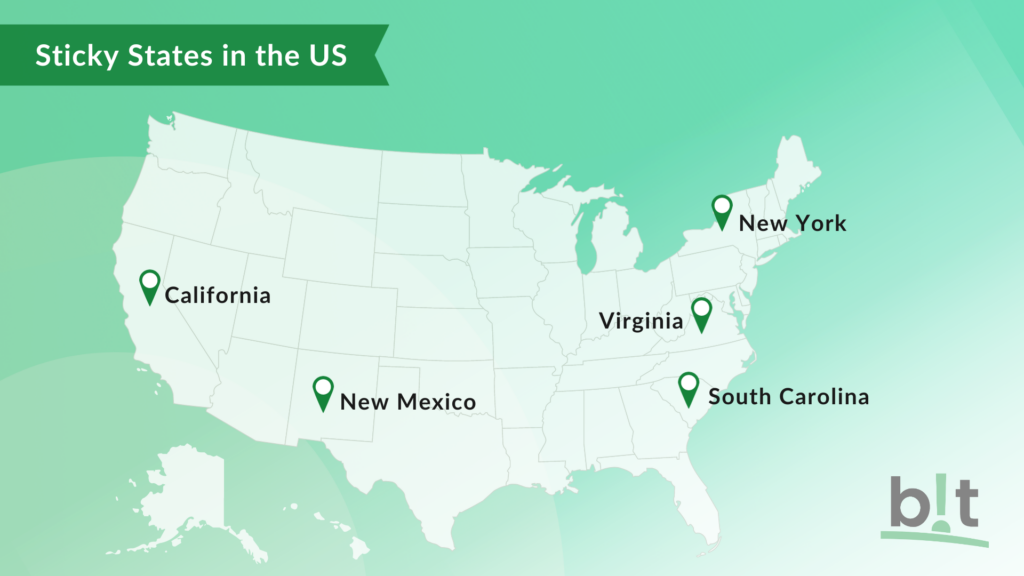If you’re a US citizen or permanent resident who has moved abroad, you might think that you’re off the hook for state taxes — but if you most recently lived in Virginia, you may very well still be subject to an annual Virginia tax obligation.
It may not seem fair, but Virginia is one of a handful of states that make it extra challenging for former residents to change their state residency and, by extension, their state tax obligations. Here’s what you need to know.
Key Updates for 2025:
- Virginia’s state tax filing deadline for expats is July 1, 2025, with an automatic six-month extension if needed.
- The income threshold for filing remains $11,950 (single) and $23,900 (married filing jointly).
- Virginia’s tax rates for 2025 are 2%–5.75%, depending on income level.
State tax liability for US expats
All Americans — even those who have moved abroad — must file a federal income tax return, provided that their income meets the minimum reporting requirements. Whether or not expats must file and pay state taxes, however, depends largely on how the state they most recently lived in defines tax residency.
Understanding state residency requirements
Each state defines tax residence slightly differently, but most won’t consider former residents who moved abroad to be tax residents as long as they don’t maintain significant ties to the state after their departure, such as:
- Maintaining a domicile (i.e. true and permanent home) there
- Spending more than 183 days out of the tax year there or frequently returning for long stays
- Physically working in state or earning income sourced there (e.g. income from a rental property located in the former state)
- Having business or financial interests based there (e.g. a business registered in the former state)
- Having dependents or immediate family that live there
In many states, people who fail to qualify as residents based on the above criteria simply file a part-year tax return for the year they left the state to be freed of their tax obligations. Regardless of how your state filing requirement wraps up, you should always be ready to provide proof that you don’t live there anymore if the state tax authority contacts you.
However, expats should always check the specific requirements of the last state they lived in to make sure they follow the appropriate protocols.
What is a sticky state?
A few states, in particular, make it more challenging to terminate residency (and therefore avoid state income tax liability). Unfortunately, one of these so-called “sticky states” is Virginia (the other four are California, New Mexico, New York, and South Carolina).

Virginia state tax obligations for expats
The Virginia Department of Taxation requires residents, part-year residents, and certain nonresidents to file a state tax return if they earn a Virginia Adjusted Gross Income of at least $11,950 for single individuals or married individuals filing separately and $23,900 for married couples filing jointly.
Frustratingly, moving directly from Virginia to another country is not enough to exempt you from having to file a Virginia state tax return. To truly end your tax residency, you must establish a domicile in another state (more on that later).
Virginia state income tax rates for 2024
Expats who must file a Virginia state tax return can expect to pay taxes at the following marginal rates for the 2025 tax year (e.g. taxes filed in 2026):
| Income earned | Tax rate |
|---|---|
| $0 – $3,000 | 2% |
| $3,001 – $5,000 | 3% |
| $5,001 – $17,000 | 5% |
| $17,001+ | 5.75% |
Filing procedures for expats from Virginia
The deadline for filing Virginia state taxes from abroad is typically May 1st, but those who are outside of the US on the May 1st deadline have until July 1st to file. If you can’t file by then, however, the state offers an automatic six-month extension. Note that all tax payments should still be made by May 1st, to avoid interest and penalties.
To satisfy their Virginia tax filing requirement, residents must fill out Form 760, part-year residents must fill out Form 760PY, and nonresidents must fill out Form 763. Those who earn an adjusted gross income of less than $32,000 can complete these forms for free on 1040 Now.
If you earn more than that amount, however, you’ll have to file using a different tax software provider, have a tax professional file on your behalf, or print the completed form and mail it to the appropriate office in the city or county where you most recently lived.
Should you change your Virginia state residency?
Some expats who previously lived in Virginia choose to change their state residency when moving abroad to a state that has fewer filing requirements or lower/no income taxes. Among the most popular options are Alaska, Florida, Nevada, South Dakota, Texas, Washington, and Wyoming.
It’s important to note, though, that changing state residency isn’t right for everyone, such as those who plan to eventually return to their former state of residence. Before starting the process, it’s best to talk through your options with a tax professional well-versed in the implications of moving abroad.
Establishing residency in a more favorable state
If you do choose to end your Virginia state residency, you must prove that you are domiciled in another state. To do so, you must sever any existing ties you maintain in Virginia (look to the “Understanding state residency requirements” section above for reference) and then establish ties in your desired state, such as by:
- Buying or renting real estate there
- Transferring your vehicle registration there
- Obtaining a driver’s license or official ID from there
- Registering your business there
- Moving your belongings there
- Spending 183 or more days of the year there
- Opening financial accounts there
- Applying for pet licenses there
- Updating your mailing address
Make sure to have proof of any of these changes you make — and remember, domiciling in another state isn’t always straightforward, so it’s best to talk to a tax professional or lawyer to ensure you’ve taken the appropriate steps.
References:
- How to Establish State Residency (And Why It Matters)
- How to stop paying state tax when I move overseas?
- Who Must File | Virginia Tax
- Residency Status | Virginia Tax
- Draft 2023 Form 760 Resident Individual Income Tax Instructions
- When to File | Virginia Tax
FAQs: Virginia State Taxes for Expats
-
Do I still owe Virginia state taxes if I move abroad?
Yes. Virginia is a “sticky state,” meaning moving abroad alone does not terminate your tax residency. Unless you establish domicile in another state, you may still be required to file and pay Virginia state taxes.
-
How can I end my Virginia tax residency?
To officially terminate your Virginia tax residency, you must establish domicile in another state by severing all significant ties with Virginia (e.g., property ownership, voter registration, driver’s license) and setting up new ties in a different state.
-
What is the income threshold for filing a Virginia state tax return in 2025?
For the 2024 tax year (filed in 2025), you must file if your Virginia Adjusted Gross Income (VAGI) is at least $11,950 (single or married filing separately) or $23,900 (married filing jointly).
-
What are Virginia’s income tax rates in 2025?
Virginia’s state tax rates remain:
- 2% on income up to $3,000
- 3% on income from $3,001 to $5,000
- 5% on income from $5,001 to $17,000
- 5.75% on income above $17,000
-
What is the deadline for filing Virginia state taxes from abroad in 2025?
Expats living abroad on May 1, 2025, automatically receive an extension until July 1, 2025. If you need more time, Virginia grants an automatic six-month extension to November 1, 2025, but any tax due must still be paid by May 1 to avoid interest.
-
Can I file my Virginia state tax return online?
Yes. Expats earning less than $32,000 AGI can file for free using 1040 Now, while those earning more must use alternative tax software, hire a tax professional, or mail a paper return.

 Connect on LinkedIn
Connect on LinkedIn





